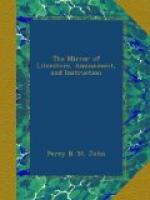Ney seldom appeared at court. He could neither bow nor flatter, nor could he stoop to kiss even his sovereign’s hand without something like self-humiliation. To his princess, on the other hand, the royal smile was as necessary as the light of the sun; and unfortunately for her, she was sometimes disappointed in her efforts to attract it. Her wounded vanity often beheld an insult in what was probably no more than an inadvertence. In a word she ere long fervently regretted the court in which the great captains had occupied the first rank, and their families shared the almost exclusive favour of the sovereign. She complained to her husband; and he, with a calm smile, advised her never again to expose herself to such mortifications if she really sustained them. But though he could thus rebuke a woman’s vanity, the haughty soldier felt his own wounded through hers. To escape from these complaints, and from the monotony of his Parisian existence, he retired to his country-seat, in January, 1815, the very season when people of consideration are most engrossed by the busy scenes of the metropolis. There he led an unfettered life; he gave his mornings to field sports; and the guests he entertained in the evening were such as, from their humble condition, rendered formality useless, and placed him completely at his ease.
It was here that on the 6th of March he was surprised by the arrival of an aide-de-camp from the minister at war, who ordered him, with all possible despatch, to join the sixth division, of which he was the commander, and which was stationed at Besancon. In his anxiety to learn the extent of his instructions, Ney immediately rode to Paris; and there, for the first time, learned the disembarkation of Buonaparte from Elba.
Ney eagerly undertook the commission assigned him of hastening to oppose the invader. In his last interview with Louis his protestations of devotedness to the Bourbons, and his denunciations against Napoleon, were ardent—perhaps they were sincere. Whether he said that Buonaparte deserved to be confined in an iron cage, or that he would bring him to Paris in one, is not very clear, nor indeed very material.—We reluctantly approach the darker shades in the life of this great officer.
On his arrival at Besancon, March 10th, he learned the disaffection of all the troops hitherto sent against the invader, and perceived that those by whom he was surrounded were not more to be trusted. He was surrounded with loud and incessant cries of Vive l’Empereur! Already, at Lyons, two members of the royal family had found all opposition vain; the march of Napoleon was equally peaceful and triumphant. During the night of the 13th, Ney had a secret interview with a courier from his old master; and on the following morning he announced to his troops that the house of Bourbon had ceased to reign—that the emperor was the only ruler France would acknowledge! He then hastened to meet Napoleon, by whom he was received with open arms, and hailed by his indisputed title of Bravest of the Brave.




